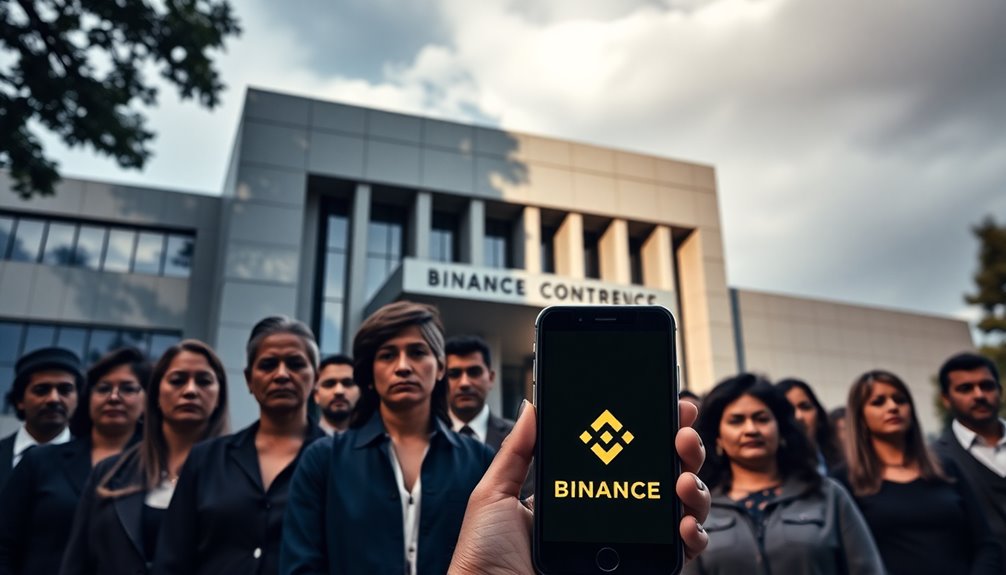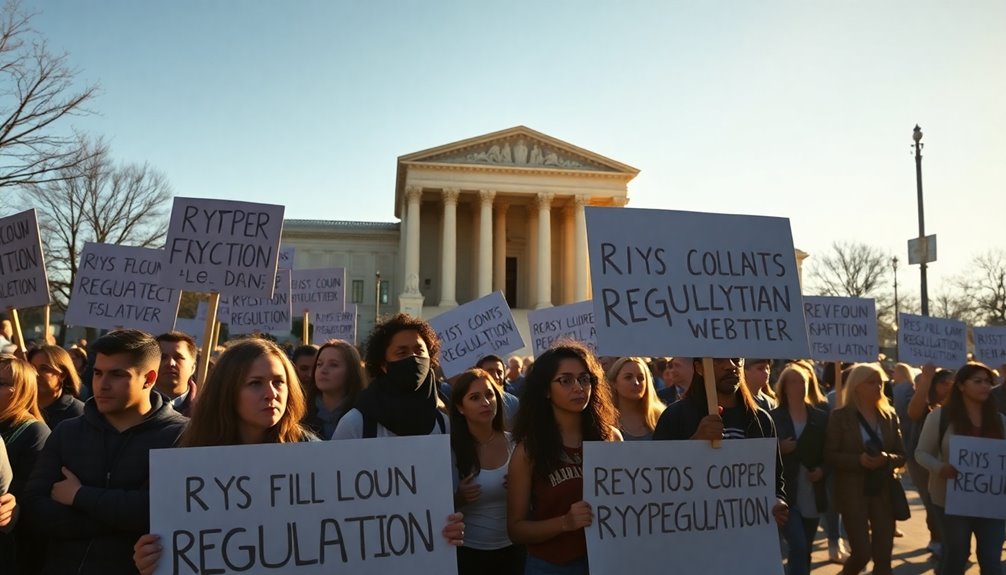You're right to be concerned about Binance, as the U.S. Supreme Court's recent refusal to hear its appeal means the class action lawsuit will proceed. This comes amidst SEC accusations that Binance misled U.S. investors and failed to comply with local laws. As a result, Binance and its founder, Changpeng Zhao, are facing heightened legal challenges that could impact their operations and financial standing. The ruling raises questions about cryptocurrency regulation and investor safety. If you want to see how these developments might affect the crypto landscape, there's more to uncover.
Key Takeaways
- The U.S. Supreme Court's refusal to hear Binance's appeal permits a class action lawsuit against the company to proceed.
- Binance faces allegations of misleading U.S. investors and violating securities laws by selling unregistered tokens.
- The legal challenges include accusations of inadequate transaction monitoring and potential violations of the RICO Act.
- This ruling raises concerns about Binance's future compliance and operational integrity in the U.S. market.
- The decision amplifies regulatory scrutiny, potentially impacting Binance's financial standing and investor sentiment.
Binance's Legal Challenges Escalate

As Binance faces mounting legal challenges, its troubles have intensified following a Supreme Court decision to dismiss its appeal against a class action lawsuit.
The SEC's charges from June 2023 highlight serious regulatory concerns, accusing Binance of misleading U.S. investors and violating securities laws.
You might find it alarming that Binance.US has struggled with compliance, particularly regarding local laws and anti-money laundering (AML) standards. Allegations of inadequate transaction monitoring and KYC failures suggest significant operational deficiencies. Furthermore, Binance has faced ongoing legal scrutiny that could adversely impact its operational stability.
Additionally, the class action lawsuit claims that Binance facilitated money laundering activities, potentially violating the RICO Act.
With multiple legal battles unfolding, Binance's future hangs in the balance as it grapples with increased scrutiny from regulators.
Supreme Court Rejects Binance Appeal

The Supreme Court's refusal to hear Binance's appeal marks a significant turning point in the ongoing legal battles the exchange faces.
By declining to review the lower court's decision, the Supreme Court allows the revived class action lawsuit to proceed. This lawsuit accuses Binance and its founder, Changpeng Zhao, of violating U.S. securities laws by engaging in unregistered token sales and failing to disclose risks associated with these transactions.
The 2nd Circuit Court's ruling established that U.S. laws apply due to the nature of token purchases and Binance's use of American servers. This ruling is particularly noteworthy as it highlights the potential applicability of U.S. laws to foreign trading platforms.
As a result, Binance is now confronted with heightened legal challenges, potentially impacting its financial standing and overall operations moving forward.
Cryptocurrency Volatility and Regulation

While shifting market sentiment can rapidly alter the landscape of cryptocurrency prices, regulatory changes also play a pivotal role in driving volatility.
You'll notice that positive news can propel prices upward, while negative reports lead to sharp declines. Emotional trading fueled by fear or greed can exacerbate these fluctuations, creating a chaotic environment. Additionally, security breaches can contribute to investor panic, further complicating the market dynamics. The importance of staying updated on market trends cannot be overstated, as timely information can greatly influence trading decisions.
Regulatory announcements, like those from the SEC, can result in sudden market shifts, leaving you scrambling to recalibrate your strategies. The absence of comprehensive regulations adds another layer of uncertainty, making it difficult for exchanges to navigate.
Furthermore, the decentralized nature of cryptocurrencies complicates regulatory efforts, which can keep the market in a state of flux. Staying informed is crucial as these dynamics unfold.
Crypto ETFs and Institutional Interest

Market volatility and regulatory uncertainty have sparked significant interest in crypto exchange-traded funds (ETFs) as a means for investors to gain exposure to digital assets. These ETFs track the value of Bitcoin and trade on traditional exchanges like the NYSE, allowing you to invest without using a cryptocurrency exchange. Institutional interest is growing, with a third of investors increasing their crypto allocations recently. Over half of them expect to continue boosting their investments in the next three years. This trend enhances market liquidity, stabilizes prices, and encourages the development of secure custody solutions, addressing security concerns. As institutional players enter the space, the overall crypto market gains maturity and credibility, making it an appealing investment option for you. Additionally, the rise of Bitcoin ETFs provides a regulated investment vehicle that appeals to both institutional and retail investors. Furthermore, the increasing popularity of crypto ETFs reflects a broader acceptance of digital assets within traditional investment frameworks.
Regulatory Scrutiny in Washington

As regulatory scrutiny intensifies in Washington, Binance faces significant challenges that threaten its operations in the U.S. The loss of its operating license, effective August 20, 2024, means Binance.US will cease operations in Washington state, reflecting a broader trend in crypto regulation.
This marks the eighth time Binance.US has encountered regulatory obstacles, following the former CEO's conviction for money laundering. States like North Dakota have revoked licenses, crippling the exchange's ability to conduct fiat transactions. Additionally, a revived SEC lawsuit adds to the pressure, as investors argue that domestic securities laws apply to their token purchases. Settlements with U.S. agencies have resulted in hefty penalties and ongoing compliance obligations, further complicating Binance's future in the market. The ongoing increased scrutiny is expected to impact operations nationwide, raising concerns among investors about the sustainability of the exchange.
Investor Sentiment Shifts Drastically

Investor sentiment has shifted dramatically in response to Binance's legal troubles, with many feeling uncertain about the future of their investments.
Tokens like ELF, EOS, and TRX have seen significant declines as investors react to the accusations against Binance. Many are seeking to recoup losses through a class-action lawsuit, amplifying fears of market volatility. The Supreme Court's ruling has introduced regulatory uncertainty, shaking confidence in not just Binance, but cryptocurrency exchanges at large. This ruling confirmed the applicability of U.S. securities laws to Binance, raising concerns about future compliance requirements for global exchanges.
Negative publicity and trust issues are also surfacing, leading investors to question Binance's reliability.
As the crypto community discusses these developments, the brand's image continues to suffer, making it crucial for you to reassess your investment strategies moving forward.
Conclusion
As Binance's legal battles heat up, you can feel the tension in the crypto world rising like a rocket. With the Supreme Court denying their appeal, the stakes are higher than ever. Regulatory scrutiny is intensifying, and investor sentiment is shifting dramatically. It's crucial to stay informed and navigate these turbulent waters carefully. The future of Binance and the broader crypto landscape is uncertain, but one thing's for sure: the drama is far from over.









